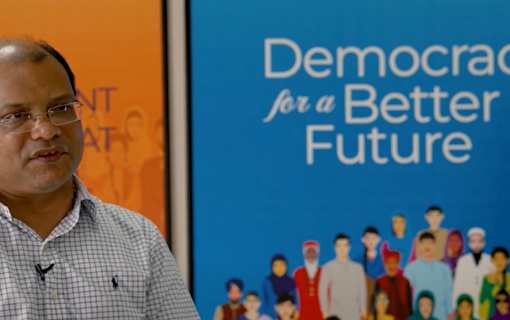IFES Civics Course Alum Serves as Precinct Election Commissioner
Prior to participating in IFES’ Democracy and Citizenship course, Nika Markozashvili possessed only basic knowledge about citizenship and the responsibilities of citizens in a democracy. The course content had a profound impact on Markozashvili’s understanding of his role in public life. “As I passed the course, [in] time I realized my role in building democratic society,” he said.
Inspired by his experience with the course, and committed to serving his country, Markozashvili worked as an election officer during the 2013 presidential elections. At 19, he was the youngest member of his precinct-level election commission; other members ranged between 35-55. He was chosen as Chair of his precinct commission after showing an aptitude for the work during training simulations. Others in his precinct cautioned him that he would face significant challenges as the Chairman, explicitly stating that his age and lack of experience in elections would hinder his ability to perform the requisite duties.
Markozashvili says he did in fact face several challenges as Chairman; not surprisingly, chief among those was establishing himself as a leader, despite his young age. He described a situation in which several of the commission members consistently missed scheduled training sessions without notice. Their absences impacted his ability to properly train the team on procedures for Election Day. Markozashvili addressed the situation by facilitating a dialogue during which the roles and responsibilities of precinct commission members were clearly communicated and agreed upon by all members.
He relied on this strategy of open and direct communication throughout his tenure as Chair, particularly on Election Day, when tensions were high.
During IFES’ civics course, students are encouraged to think critically about the needs of their communities, conduct research and develop plans for civic action that address social problems. Students transform their classroom study into extracurricular student action projects to address these social problems. Markozashvili characterized his student action project as his “first steps in civil society,” noting that it is the duty of all citizens to be active in public life.
Engaging with the community at large in this way promotes volunteerism, partnership-building and creative problem-solving. The opportunity to apply classroom learning to real world challenges in the community offers students an avenue of meaningful engagement in public affairs, and ultimately supports an active and civically engaged citizenry.
Markozashvili credits his experience in IFES’ Democracy and Citizenship course for preparing him for the experience of serving as an election commissioner. He believes the course provided a road map for engagement to young people by exploring topics related to citizenship in the classroom and then applying practical knowledge of these topics outside the classroom.
This approach reinforces conceptual knowledge and compels students to create plans that require follow-through and action. Ideally, this translates to long-term citizen engagement as young people form habits that continue into the future.
Markozashvili says he has faith in his generation, citing the huge potential for change inherent in young people, and noting that this generation has more opportunity for their ideas to come to fruition than previous ones.
His advice for young people is to make the connection between their daily life – career, school and other obligations – and political life and understand how citizens in a democracy, no matter what their profession, are responsible for making their voices heard in government.
“I will always stay [an] active member of civic society…we have to be in touch [with] civic processes all the time; that is our duty,” he said.









